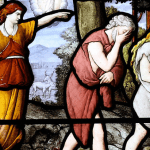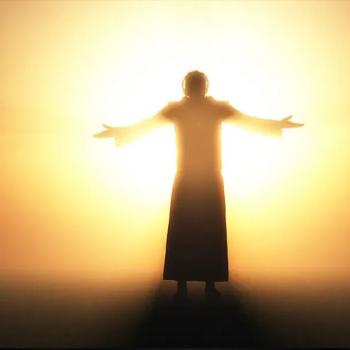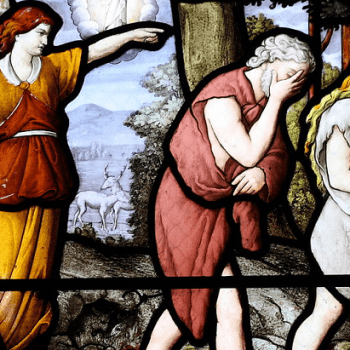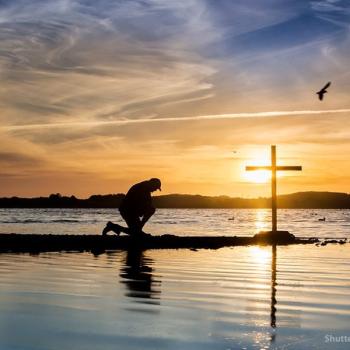 Recently, while doing research for a presentation on eastern religious traditions, I stumbled across something that I found fascinating—in Sanskrit (the ancient language of the Hindu tradition), the word “yoga” comes from the root “yuj” which can be translated into English as “to unite” “to join” “to control” or “to discipline.” Another way the word translates is simply “to yoke.” The English word “yoke” actually derives from the same Indo-European root, “yuj”. For me, this was an unexpected expansion of my previous understanding of the practice of yoga, one which had been personally benefiting me for years and one which I had recently picked back up in hopes of making it a regular practice.
Recently, while doing research for a presentation on eastern religious traditions, I stumbled across something that I found fascinating—in Sanskrit (the ancient language of the Hindu tradition), the word “yoga” comes from the root “yuj” which can be translated into English as “to unite” “to join” “to control” or “to discipline.” Another way the word translates is simply “to yoke.” The English word “yoke” actually derives from the same Indo-European root, “yuj”. For me, this was an unexpected expansion of my previous understanding of the practice of yoga, one which had been personally benefiting me for years and one which I had recently picked back up in hopes of making it a regular practice.
For most Christians, the immediate connection between our doctrine and this extra-Christian teaching is, most likely, not lost on them. We are familiar with the teachings found in Matthew where we are admonished by Christ to “take my yoke upon you” (Matthew 11:29), “for my yoke is easy, and my burden light” (Matthew 11:30). We understand that when we unite ourselves with Jesus, our walk becomes more steady, our burdens suddenly not so arduous. However, as we examine a possible additional expansion of the understanding of “to be yoked with Christ,” we may gain additional insight into how exactly we can relieve our weary souls when we feel like we simply just “can’t” anymore.
Anyone who has taken a yoga class can recall the instructor urging them to bend, to breathe, to stretch a little more until you finally get your body into those positions that at one time, you thought impossible. I have found my spiritual practice to be very much like the process my body goes into when I am doing physical yoga. When things get hard, spiritually, (and you know exactly the kind of hard I am talking about—LGBTQ issues, problematic LDS church history, fallibility of our church leaders, Biblical hermeneutical conundrums, etc.)—and I am referring to the SO HARD that you feel like your soul is bleeding, that you have trouble breathing, that the cognitive dissonance you feel is so painful and mentally challenging that you can’t possibly last another day trying to “deal” with all that load—this, my friends, this is where spiritual yoga comes into play.
Are you yoked with Christ? Are you not only allowing him to pull your load but are you listening to him gently urge you to BREATHE? To shut your mind off for a second and simpy BE. Accepting the difficult things that you do not understand along with all the things you do understand and love about your religious tradition. To breathe in that space and to simply acknowledge it without trying to take it apart and understand it all. This process is very much like when one is in a tree pose and you simply cannot transition into warrior 1 because your hamstrings are tight as violin strings and you know that if you move at all, something literally might snap.
It is in these moments that the Sanskrit understanding of yoke kicks in—Jesus is right there, saying, “don’t forget to breathe, and now stretch. Stretch a little more, and focus on your breathing. You CAN DO THIS.” Often, it is the guru who knows what we are capable of during physical yoga, not us. Without his or her guidance, moving into advanced positions is nearly impossible to do correctly. I would say the same goes for our spiritual progression as Latter-day Saints. As our church continues to evolve into the 21st century, events such as policy change, disagreement with our leaders, or lack of resonating with things said over the pulpit will push us, spiritually, to the point where we may think we literally can’t keep going anymore. I know that I, personally, have been there. For me, these are the moments when I turn to my guru, my Jesus, and listen to that still small voice that whispers, “bend, don’t break” and I find myself breathing deeply, and moving forward into another day within the body of Christ here on this earth, a day that perhaps, without my guru, I thought beforehand to be simply impossible.
So, to you my dear brothers and dear sisters in the gospel who perhaps feel that spiritually you are on the edge of despair, look inside yourself and remember to whom it is you are yoked. When we simply “can’t” anymore, remember He who already did, and take his yoke upon you. Listen to your guru and be united with him. Remember that despite all of our imperfect efforts as mortals to execute the movements that church membership within the body of Christ requires, ultimately, it his His body, and he asks us to stay. To bend with one another, to grow, to stretch. Namaste.














